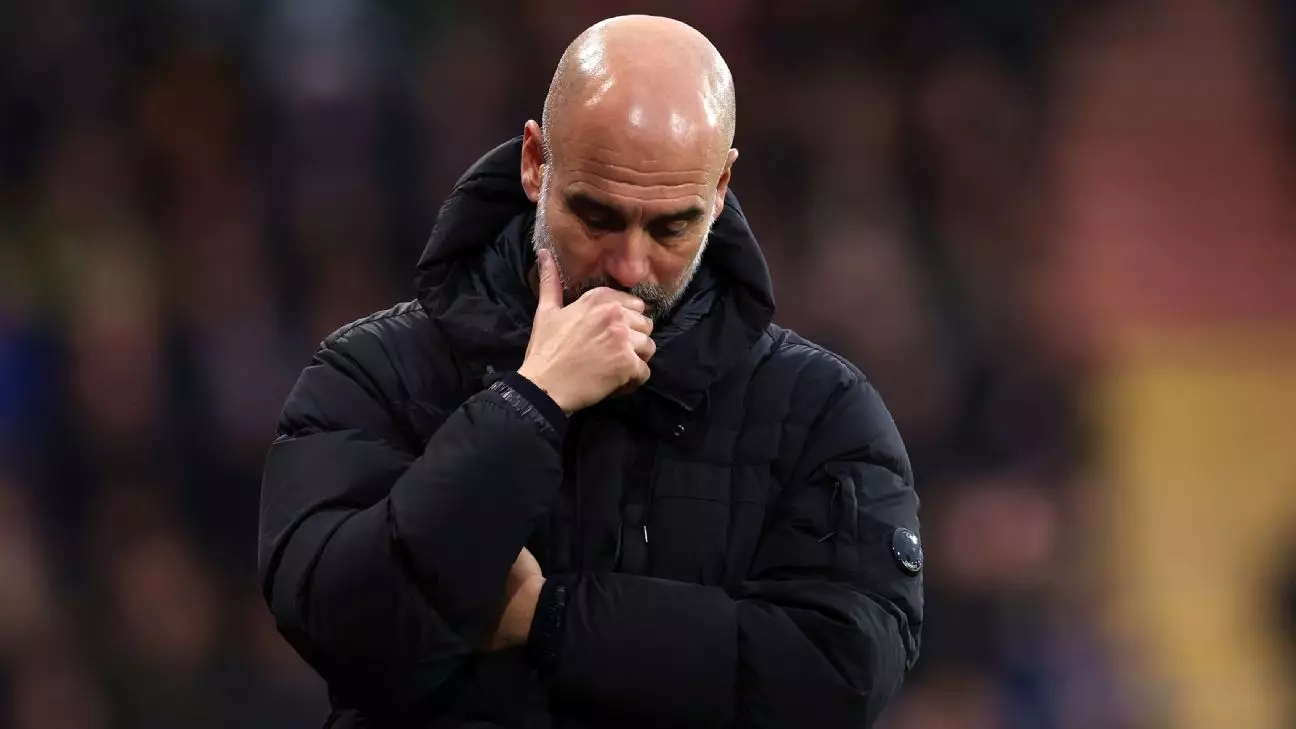Manchester City’s remarkable 32-game unbeaten run in the Premier League came to an unexpected halt with a 2-1 defeat against Bournemouth. This loss not only marked a significant setback for the reigning champions but also showcased the vulnerabilities in their squad, primarily due to a series of injuries that left key players sidelined. Despite the circumstances, manager Pep Guardiola displayed a commendable resolve by refusing to attribute the loss solely to these injuries. Instead, he emphasized the necessity for his players to elevate their performance levels and adapt to the competitive dynamics of the match.
Guardiola’s reluctance to shift the blame onto missing players reflects a deep conviction in the principles and philosophy of his management style. While acknowledging the challenges posed by injuries, he maintained that the team’s efforts fell short against a resilient Bournemouth side. His comments hint at a larger issue within the squad—an underlying problem of adaptability and intensity, factors that are crucial in maintaining success at the highest levels of competitive football.
Intensity: The Key Element Lost
City’s defeat at Bournemouth also highlighted a downfall in intensity, a key component of successful football play. Guardiola noted that his players could not match the vigor displayed by their opponents, struggling to secure possession and control the game’s flow. Bournemouth capitalized on defensive lapses and won critical aerial duels, leading to a disconcerting defensive display from City. Goals from Antoine Semenyo and Evanilson underscored City’s inability to handle long balls or deal effectively with the physical aspects of the game.
This defeat came on the heels of another disappointing outing in the League Cup against Tottenham Hotspur, pointing to a concerning trend in the squad’s current form. With the manager acknowledging a disparity in “rhythm” among his players, one wonders if a deeper, systemic issue exists. Has the exhaustive schedule and the injury crisis weakened their collective spirit? Or is it merely a temporary blip on the radar of a historically dominant team?
As the team gears up for the next match against Sporting in the Champions League, the injury crisis looms large. Key players like Jack Grealish, Rodri, and Oscar Bobb were already out, with further absences among Rúben Dias and John Stones compounding the situation. Guardiola’s desperate appeal for players to “play through pain” reflects the toll that injuries take not only on squad depth but also on the mental strength of those who are left to carry the team through rough patches.
Captains like Kyle Walker’s participation, despite a lack of training, showcases both determination and the necessity for leadership. However, it also raises questions about the sustainability of such practices, given that players risking further injury could lead to a cascade of problems down the stretch of the season.
In stark contrast, Bournemouth savored a memorable victory, their first-ever win over Manchester City, and the buoyancy displayed by the Cherries fans was palpable. Manager Andoni Iraola underscored this achievement by emphasizing that the team played without fear, showcasing a tactical mindset that allowed them to challenge City. The chants from the home supporters asking, “Can we play you every week?” served as a reminder of the competitive unpredictability that makes football a thrilling sport.
Iraola’s strategy during the match effectively disrupted City’s rhythm, enabling his players to press at opportune moments while maintaining a structured defense. This approach not only secured a historic win but also instilled a newfound confidence within the Bournemouth squad, proving that tenacity and tactical discipline can overcome moments of adversity.
Moving forward, City’s focus must shift quickly as they face demanding fixtures ahead. With injuries still plaguing the squad, the upcoming games will challenge both players and management alike. Guardiola’s leadership will be put to the test as he seeks to instill confidence and resilience within a beleaguered squad.
While City’s defeat against Bournemouth served as a wake-up call, it also highlighted the complex interplay of injuries, team dynamics, and match intensity. The path to recovery may not be straightforward, but with the right adjustments and a return to form, Manchester City can once again reign supreme, provided they address the issues that led to this unexpected downturn.

